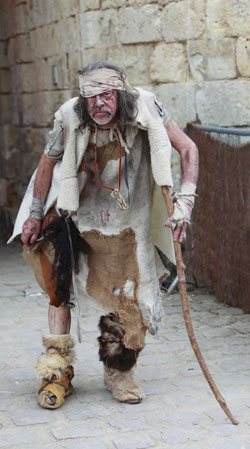Contributed by John Wertz, Blacksburg, VA
Warm-up Question
Think about the last time you were really sick. Who helped you to deal with your illness? How did you express your gratitude to that person?
The Cost of Healing
Everyone will get sick at some point in their lives, however, since a visit to the doctor or the emergency room, can cost hundreds or thousands of dollars, it has not always been possible for those who are sick to see a doctor, especially if they lack insurance. According to the Health Insurance Coverage Estimates produced by the Centers for Disease Control and Prevention, “In the first 3 months of 2013, 46.0 million persons of all ages (14.8%) were uninsured at the time of interview, 57.4 million (18.5%) had been uninsured for at least part of the year prior to interview, and 34.5 million (11.1%) had been uninsured for more than a year at the time of interview.” When the statistics are examined more closely, it becomes clear that the uninsured rate is even higher for those on the lower end of the socio-economic scale. For people who are considered poor (those earning up to $23,550 in income for a family of 4) or near poor (those earning up to $47,100 in income for a family of four), the uninsured rate rises to nearly 30%. (accessed Sept. 30, 2013 – http://www.cdc.gov/nchs/data/nhis/earlyrelease/insur201309.pdf and http://aspe.hhs.gov/poverty/13poverty.cfm#guidelines). For those struggling to make a living, therefore, adequate health care can be out of their financial reach and a major medical event can mean financial disaster.
In an attempt to provide access to health care to all Americans, the Federal government passed the Affordable Health Care Act in 2010. After three years of lawsuits and political wrangling, the Act went into effect at the beginning of this month. While it will be years, before the success or failure of this law can be accurately measured, in the short-term millions of our most vulnerable neighbors will now have access to medical insurance and the care that they need when they are ill.
Discussion Questions
- Do you think that access to health care is a right or a privilege?
- Do you think a certain level of care should be available to everyone regardless of their financial resources?
- For many people, money is at the heart of the discussion over health care. How much do you think it should cost to go to the doctor? How does that compare to what you are willing to pay for other goods and services?
Scripture Texts (NRSV) for Sunday, October 13, 2013 (Twenty-first Sunday after Pentecost)
(Text links are to Oremus Bible Browser. Oremus Bible Browser is not affiliated with or supported by the Evangelical Lutheran Church in America. You can find the calendar of readings for Year C at Lectionary Readings.)
For lectionary humor and insight, check the weekly comic Agnus Day.
Gospel Reflection
“Jesus, Master, have mercy on us!” (Lk 17:13) If there was ever a group of people who could use God’s mercy and the healing presence of Jesus, it was definitely the lepers. These men and women, who were battling the affects of a long-term, debilitating disease, were outcasts from society and essentially unemployable. Regardless of their social standing or skill set before they became ill, lepers were forced to survive on the charity of others and to live in a colony with those coping the disease.
Their cry, Luke says, came from a distance. Lepers always kept their distance from the rest of society, because to get too close was to risk subjecting someone else to the pain and suffering that dominated their lives. “Jesus, Master, have mercy on us!” was their plea, but what form did they expect Jesus’ mercy to take? Were they seeking a financial donation from him like the donations they had sought from travelers before him? Were they looking for a gift of food like the 5,000 had received? Were they hoping for healing like the crippled woman who could now walk again? Obviously, we cannot know everything that was racing through the minds of those ten lepers as they called out to Jesus, but Jesus’ response to their cry is immediate and clear, “Go and show yourselves to the priest.”(Lk 17:14) He doesn’t ask them to jump through any hoops. He doesn’t call them over so he can perform a ritual. Jesus hears their cry for help and acts to restore health and wholeness to their lives.
The healing, it is worth noting, didn’t happen immediately. It was only after the lepers obeyed Jesus’ command and began walking toward the priests who could certify their healing and release them from their unclean status that they noticed a change in their health. As they walked, as they obeyed Jesus command, they experienced God’s healing power and were made well.
It’s hard to blame the nine who didn’t come back to thank Jesus and to praise God. After all, Jesus told them to go to the priest and once they were declared clean, they could go home. Almost anyone in their shoes would have raced to share the good news with their family and friends, but one leper returned. One former leper gave glory to God in a loud voice and prostrated himself at Jesus’ feet. One newly healed Samaritan understood that Jesus offered more than simply a path back into the world. One man of faith believed in Jesus and discovered not simply physical healing, but the key to a whole, healthy life of faith. Jesus command, “Get up and go on your way; your faith has made you well” (Lk 17:19) is not the end of the story, but a new beginning for this once ailing man who now returns to the world free from the horrors of leprosy and connected to the new life that comes from faith in Jesus.
Discussion Questions
- If you were one of the ten lepers who were made clean, do you think you would have returned to thank Jesus?
- Even though leprosy is not a major disease in the world today, there are still millions of people who are isolated and left out of society. What are some of the ideas, situations and circumstances that make someone a ‘leper’ in today’s world? What do you think it is like to live on the edges of society?
- How can we follow Jesus’ example and show mercy to those who are in need of healing and hope?
Activity Suggestions
- Work with your church to assembly Personal Care Kits or Baby Care Kits which can be distributed by Lutheran World Relief to people around the world in need of healing and help. More information on LWF kits can be found at: http://lwr.org/getinvolved/kits
- “Thank You Day” – pick a day to go out of your way to say, “Thank You!” Pay special attention to all the ways that people assist and help you throughout the day. Acknowledge their help with words of thanks and consider writing a personal note to those who make the biggest impact in your life.
Closing Prayer
Gracious God, you reach out to us with your compassion and caring. Bless all those who use their gifts to bring healing and health to others. In our times of need, help us to experience your merciful presence and make us always thankful for the gifts you have given us. In your name we pray. Amen.



